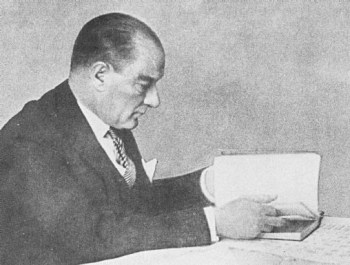| Culture and the Arts
"We shall make the expansion and rise of Turkish culture in every aera the mainstay of the Republic." Among the prominent statesmen of the 20th Century few articulated the supreme importance of culture as did Atatürk who stated: " Culture is the foundation of the Turkish Republic." His view of culture encompassed the nation's creative legacy as well as the best values of world civilization. It stressed personal and universal humanism. " Culture," he said, " is a basic element in being a person worthy of humanity," and described Turkey's ideological thrust as " a creation of patriotism blended with a lofty humanist ideal." To create the best synthesis, Atatürk underlined the need for the utilization of all the viable elements in the national heritage, including the ancient indigenous cultures, and the arts and techniques of the entire world civilization, past and present. He gave impetus to the study of the earlier civilizations of Anatolia - including Hittite, Phrygian, Lydian, and others. Pre-Islamic culture of the Turks became the subject of extensive research which proved that, long before their Seljuk and Ottoman Empires, the Turks had already created a civilization of their own. Atatürk also stressed the folk arts of the countryside as the wellspring of Turkish creativity.
The visual and plastic arts (whose development had been arrested by some bigoted Ottoman officials who claimed that the depiction of the human form was idolatry) flourished during Atatürk's Presidency. Many museums were opened. Architecture gained new vigor. Classical Western music, opera and ballet as well as the theater took impressive strides. Several hundred "People's Houses" and the " People's Rooms" all over Turkey gave local people and youngsters a wide variety of artistic activities, sports, and other cultural affairs. Book and magazine publication enjoyed a boom. Film industry started to grow. In all walks of cultural life, Atatürk's inspiration created an upsurge. Atatürk's Turkey is living proof of this ideal - a country rich in its own national culture, open to the heritage of world civilization, and at home in the endowments of the modern technological age. |





















